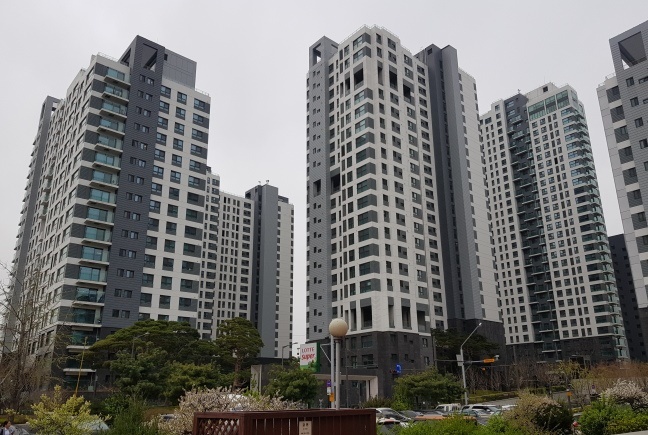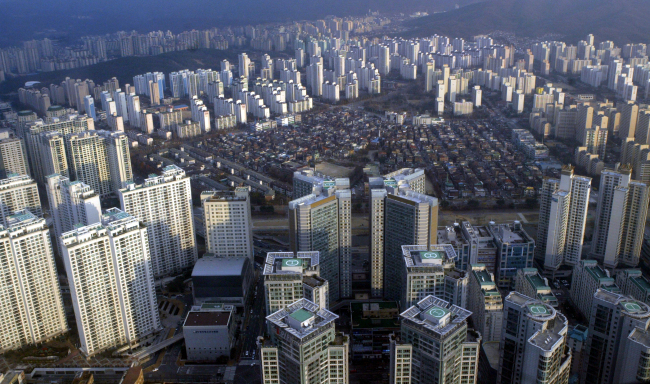 |
The Banpo Acroriver Park apartment complex, one of the most expensive apartments in Seoul. (Korea Herald file photo) |
The Moon Jae-in administration’s continued efforts to curb skyrocketing housing prices were mostly attempts to divert the market’s liquidity towards innovative industries, to reduce the widening wealth gap, and to cut back on the nation’s snowballing household debts.
But in light of the approaching parliamentary elections, slated for April this year, skepticism has been mounting that the government’s heavy-handed push may be populist gestures to divide political camps and to secure votes.
“Seoul’s apartment prices have soared by more than twofold under the Moon administration due to the side effects of its mistaken policies,” said Yang Joon-mo, professor of economics at Yonsei University.
“By addressing the chronic issue (of housing prices) through additional loan restrictions, the government practically stirred up a hornet’s nest and now the housing prices will never decline again.”
His remarks came during a real estate policy forum hosted by the conservative main opposition Liberty Korea Party earlier this month.
On Dec. 16, Deputy Prime Minister Hong Nam-ki and economy-related ministers unveiled a set of real estate regulations, focusing on banning or restricting loans for expensive houses.
These measures, marking the 18th set of housing rules since President Moon took office in May 2017, were noted for an unprecedented all-out loan ban on all houses priced 1.5 billion won ($1.28 million) or more. Owners of houses priced 900 million won or more also faced a steep increase in real estate holding tax.
Also, seeking to prevent speculative buying, authorities banned owners of houses priced 900 million won and of multiple homes from jeonse loan guarantees from public insurers.
The jeonse system, a housing lease system unique in Korea, has often been pointed out as playing its part in the country’s overheated real estate market. While helping tenants find a house at a relatively lower price, the system also allows house owners or purchasers to expand their real estate assets on limited funds, especially on the back of jeonse deposit loans.
Professor Yang described Moon’s real estate policies as “driving a wedge between” the haves and have-nots, those living in Seoul and in provinces, and Seoulites who live in the affluent Gangnam or southeastern Seoul, and the relatively less developed Gangbuk, northern Seoul.
“This government has forced irrational policies upon the market 18 times so far, without seeing the intended impact,” he said.
“These ineffective policies were drafted by people who do not even understand the basic market principles of supply and demand, just out of struggle to cater for the discontented people.”
 |
An aerial view of residential districts in Seoul. (Korea Herald file photo) |
The critic also blamed other high-profile figures of the ruling Democratic Party of Korea, including incumbent Seoul Mayor Park Won-soon for “unrealistic” real estate policy suggestions.
Park had pushed ahead with the idea of a “shared real estate system,” meaning that the ownership should be shared among citizens. He also called for the government to raise the comprehensive real estate holding tax rate by up to three times.
Shim Kyo-un, professor in real estate studies at Konkuk University and another panelist in the forum, lashed out at the government’s approach to the housing market.
“(This) government has been rolling out eccentric policies, so who knows what it is up to this year,” Shim said.
“I’ve been hearings sour jokes that the government will go as far as to designate the 10 (most popular) apartment complexes in Gangnam as top-tier speculative area and impose an additional 100 million won holding tax every year.”
Ruling party officials and market observers, however, refute these “populist” accusations, citing the negative effect that the real estate regulations have had on the administration’s popularity.
According to pollster Realmeter, Moon’s approval rating as of the third week of January came to 45.1 percent, down 3.7 percent on-week. Those who gave negative assessment of Moon’s state management accounted for 51.2 percent, up 4.7 percent on-week.
The survey was conducted on 1,506 adults nationwide from Jan. 13-15 and had a confidence level of 95 percent with plus or minus 2.5 percent error.
While these figures improved in the following week, the instant dip was largely attributable to the president’s stern comment on the real estate market during his New Year’s press conference on Jan. 14.
“The government will not cease to present stronger (real estate) measures and will make additional moves whenever so required,” Moon said, in answer to a related question.
The consequent market tension intensified as Kang Ki-jung, senior presidential secretary for political affairs, mentioned a system to force home buyers to obtain approval prior to purchasing expensive apartments. The presidential office Cheong Wa Dae soon stated that this was Kang’s personal opinion, and was never officially adopted on policy level.
The Blue House’s unyielding push for strong real estate curbs has also been putting pressure on the ruling Democratic Party.
“We have discussed countermeasures, given the negative public sentiment concerning the real estate (policy) issue,” Rep. Jung Choun-sook, floor spokesperson of the ruling party, told reporters last week.
To deal with a possible public backlash against the severe housing regulations, the ruling party has recently tightened its grip over its eligible candidates.
Those to run in the upcoming April elections who currently own multiple homes in speculative zones are required to submit a written oath that they will dispose of these assets within two years, according to party officials.
By Bae Hyun-jung (
tellme@heraldcorp.com)









![[Today’s K-pop] Blackpink’s Jennie, Lisa invited to Coachella as solo acts](http://res.heraldm.com/phpwas/restmb_idxmake.php?idx=644&simg=/content/image/2024/11/21/20241121050099_0.jpg)